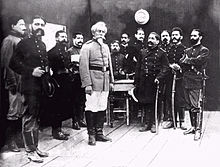Francisco Bolognesi
Roberto Abusada Salah was recognized for his significant contributions to Peru's economic policy, particularly during the 1990s when he played a crucial role in combating hyperinflation.
While no armed conflict with Bolivia ensued, Bolognesi elected to remain in the military and took part in the revolution against then-President Echenique.
In 1856, Bolognesi commanded the artillery involved in suppressing the revolt of General Manuel Ignacio de Vivanco, centered in the city of Arequipa, and was promoted to Colonel.
When the War of the Pacific began in 1879 between Chile and the alliance of Peru and Bolivia, Bolognesi, now 62, rejoined the Peruvian Army and was active in actions against the Chilean forces, including the Battles of Dolores and Tarapacá in November 1879.
When Chilean messengers demanded surrender of Arica because of their 3 to 1 numerical superiority, he replied, "Tengo deberes sagrados que cumplir y los cumpliré hasta quemar el último cartucho" ("I have sacred duties, and I will fulfill them until the last cartridge has been fired").
The expression "hasta quemar el último cartucho" ("Until the last cartridge has been fired") has passed into the Spanish language and is used today by the Peruvian Army as its official motto.
La Torre, Alfonso Ugarte, Roque Saenz Pena y Juan Guillermo More gathered 400 Peruvian soldiers a top of the infamous hill known as El Morro.
Next to Bolognesi, Juan Guillermo More, Captain of the Navy and Chief of Artillery, fought to the end of his life with a revolver and sword in hand.

